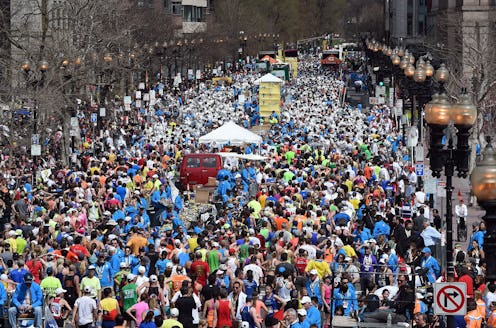News
Which Boston Bombing Survivors Are Running Today?
Two years after the Boston Marathon bombings left the country reeling, the pain remains raw for many of those who experienced it firsthand. But that's not stopping some survivors from coming back and reclaiming the finish line, even after serious injuries nearly prevented them from running ever again. By participating in this year's marathon (and, in many cases, last year's), these survivors embody the spirit of courage and survival the world's oldest marathon has come to symbolize.
The 119th Boston Marathon is taking place on Monday, one day ahead of Dzhokhar Tsarnaev's sentencing trial. This will determine whether the bomber, who was found guilty of all 30 charges against him, will be executed or spend life in prison without parole. However, the trial probably isn't on runners' minds as they prepare to complete the 26.2 miles, determined to take back the race that devastated their city and reclaim it.This year, more than two dozen survivors will partake in the race, from one who lost her leg as a result of the blast to another who was standing on the sidelines two years ago and wants to replace her nightmarish memories with a sense of accomplishment. Get to know the individuals who have had to overcome unthinkable pain, both mental and physical, to compete once again.
Rebekah Gregory
In 2013, Rebekah Gregory was getting ready to cross the finish line when a bomb exploded and nearly killed her. As a result, she lost a leg and now wears a prosthetic one. However, the life-changing event has not deterred her original goal. Last year, Gregory participated in the Tribute Run for survivors and first responders in a wheelchair with the assistance of a helper. On Monday, she is returning to the same race determined to cross the same finish line.
On April 15, Gregory wrote on her Facebook page:
A few days from now I will be going back to that same pavement on Boylston Street. The pavement where I thought for sure I would die, and the pavement a year ago, I was pushed around on in a wheelchair at the 1k Tribute Walk. But guess what? This time I won't be laying on the ground in pieces, or having to be assisted because I can't do things on my own. This time...the only thing hitting the ground will be my running shoe, as I show myself and the rest of the world that I am back, stronger than ever....and there is NO stopping me now. Boston I'll see you soon.
Michelle L'Heureux
For survivor Michelle L'Heureux, this will actually be her first marathon ever. Two years ago, she was one of the thousands of people cheering the runners on from the sidelines. The blast injured her so badly that she had to undergo numerous surgeries and relearned how to walk again. For her, returning to the scene that's left her both emotionally and physically scarred is her way of taking back a part of herself.
She told The Boston Globe:
It feels like overcoming what happened to me to be able to say: ‘You knocked me down but I got back up and ran a marathon. ... You pull strength from where you didn’t know you had it.
415 Strong
Since that tragic day two years ago, a group of strangers have come together and bonded over their shared pain and shared goal of conquering it. After meeting at a support group for survivors at the Spaulding Rehabilitation Hospital, 415 Strong's 25 members started their healing process by training for the annual race, to "take back the marathon."
Though most of these individuals, who were all spectators in 2013, had never run regularly, let alone a race, when the Boston Athletic Association (BAA) offered free entry into the marathon for anyone who had been injured in the bombings, they happily accepted the opportunity. Lee Ann Yanni, a cofounder of the group whose ankle was shattered in the explosion, told The Boston Globe:
We thought if we could focus on running, we could use that as a piece of healing and moving forward — literally.
Images: Rebekah Gregory DiMartino's New Day New Hope/Facebook, Getty Images (2)
